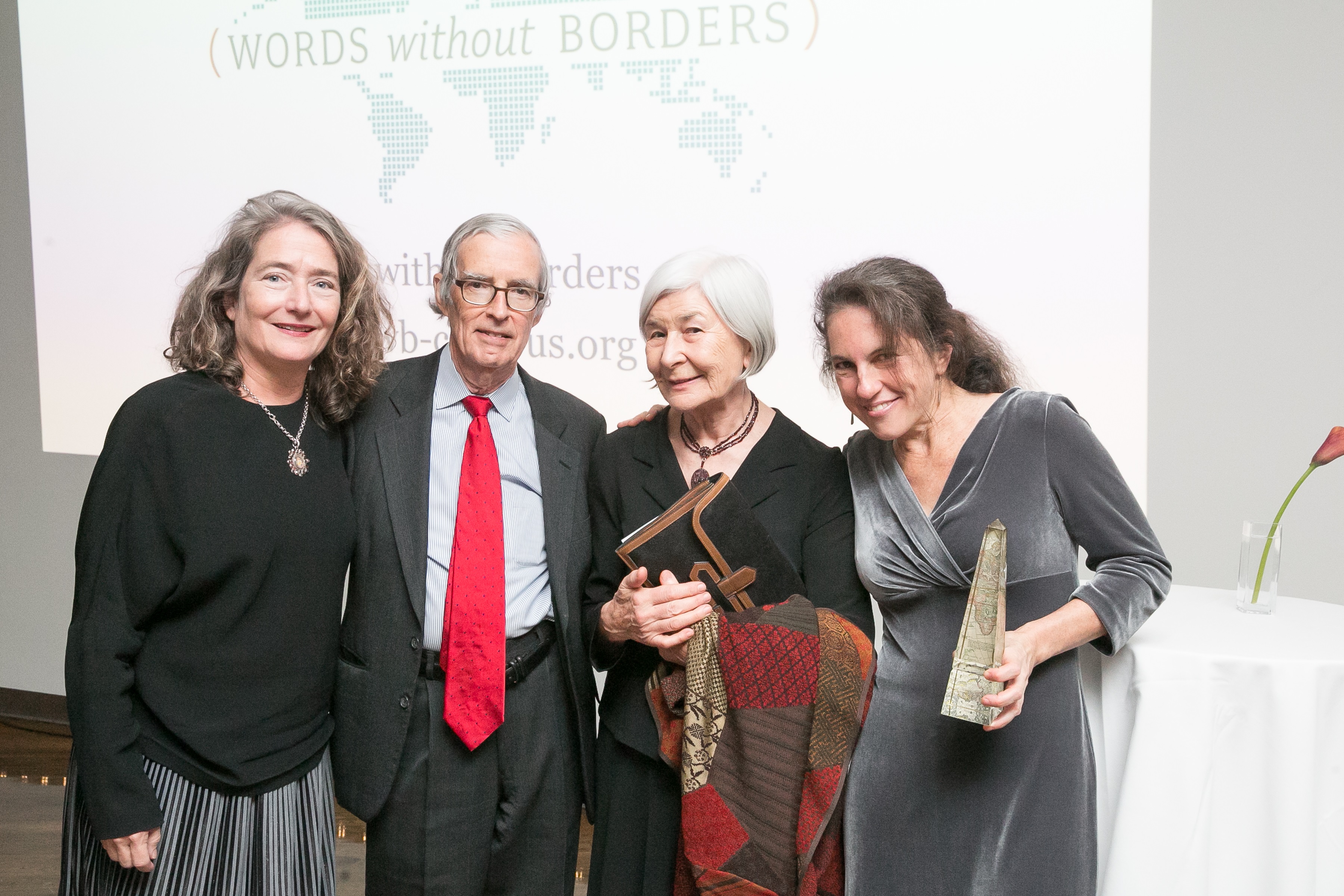The annual Words Without Borders gala celebrated the fifth anniversary of the Ottaway Award for the Promotion of International Literature on November 1, named for the first chair of the board, Jim Ottaway. This year, the award honored Jill Schoolman, publisher of Archipelago Books. Archipelago has been a stalwart of the small but dedicated cohort of advocates for international literature in the U.S. since Jill founded the house in 2003—the same year Words Without Borders was created. In her humble, sincere acceptance speech, she told the room full of publishers, writers, translators, educators, and philanthropists, “I’ve felt a special kinship with WWB from the beginning. We created ourselves around the same time for many of the same reasons… Books that Archipelago publishes allow us to lose ourselves in other cultures and explore other worlds. It is our extraordinary translators who guide us through those worlds. We are extremely lucky to be working with such talented translators who are able to make books come alive for us, in both language and spirit. This wonderful award also belongs to them, too.”

Host of the evening, author Maaza Mengiste
Many attendees and speakers throughout the night drew similarities between the political climate in which both WWB and Archipelago were created 2003 and the situation we’re in today. The poet and editor of New York Review Books Classics, Edwin Frank, presented the award to Jill, noting that publishing translations “has a political as well as a literary aspect… 2003 was also the year that Bush invaded Iraq. The existence of Archipelago stood then and stands now as a reproach to the crude parochialism of that administration and the nativism and know-nothing-ism of the current administration.” Karen Phillips, Executive Director of WWB, added in her address later, “Young people are being told that America comes first. That people who look different or sound different from them should not be here. I think we are here tonight because we believe otherwise and because we read otherwise.”

Milena Deleva, Ken Chen Georgi Gospodinov, New Directions’ Barbara Epler, and Words Without Borders’ Executive Director Karen Phillips
Despite the collective feeling that “now, more than ever” do we need to be sharing the exact kinds of stories that WWB, Archipelago and others bring us, the reality of the difficult publishing landscape and suffocating news cycle was hard to ignore. Kendall Storey, editor and publicist at Archipelago, told me, “People are being pulled in so many different directions politically now. There are so many worthy causes, not just natural disaster relief but organizations like the ACLU and Planned Parenthood that need so much support right now… We obviously think that what we do is explicitly political but people are refocusing their attention on things that they really think are explicitly political.”
Jennifer Clement, President of PEN International, believes in the political power of words, but likewise knows that, “there’s a lot of work to be done.” She recently returned from Israel, where she was visiting the Palestinian poet Dareen Tatour who is on trial for incitement of violence over poems she posted to social media. Clement told me how moving it was to meet her. She proves that “a poem is a dangerous thing.”
The persecuted Syrian poet Osama Alomar, however, told me about his residency at the Pittsburgh City of Asylum, founded by Diane Samuels and Henry Reese to provide refuge and support for exiled writers under threat. Alomar said he was driving a cab in Chicago until his application to the program was accepted. Now he is working on a book about the Syrian war for New Directions, “about dictatorship, democracy, love, hate, success, failure… a book of ideas and aphorisms.”
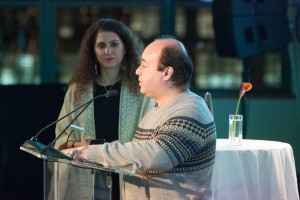
Writer Osama Alomar reading his own poetry in Arabic, and writer Alia Malek waiting to read the English translation
The list of host authors who offered readings or turned out to show their support is a testament to the dedicated community that Jill and the WWB team have helped build in New York: Álvaro Enrigue, Valeria Luiselli, Katie Kitamura, Jenny Zhang, Alexander Chee, Elliot Ackerman, Masha Gessen, and Idra Novey were just a few of the eminent literati in attendance, and NYRB, Other Press, Penguin Random House, Houghton Mifflin Harcourt, Macmillan Publishers, and others were sponsors.
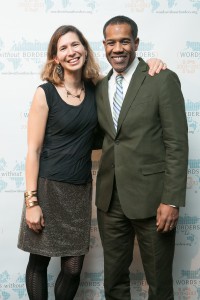
Author and translator Idra Novey and poet Gregory Pardlo
And that community shows no signs of slowing down. The WWB Campus program launched in May and has already helped bring literature from China, Mexico, Egypt, Russia, and Japan to five thousand students around the world. The program offers public access and guided curriculum in international literature for high school and college educators. Board member Doug Unger was excited to share that they are adding curriculum for Iran and later West Africa this year, and hopefully for Korea next year. “It’s been five years in the making, we tested it in seventy-five schools around the world, and now we’ve launched and are just doing our best to get the word out,” he told me. Professor of English Cheryl Smith and her student at Baruch College, Ayesha Schmitt, both shared their experience implementing the program during its pilot phase. Schmitt told the gala attendees during the dinner that although she’s lived in several countries and traveled, many of her classmates haven’t been outside the U.S. before. “It’s an opportunity to see that not everyone thinks the same as you do and it allows you to be more empathetic, to view the world through another pair of eyes.” Professor Smith spoke emphatically about the necessity for this kind of curriculum: “I really, really believe in this program… As educators, the books we put on our students’ desks are more than just required reading. They are statements about whose stories matter.”
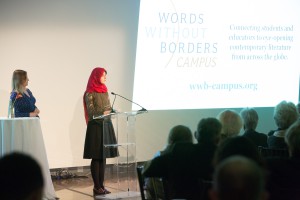
Professor Cheryl Smith and her student Ayesha Schmitt
Plus, guests were talking about Archipelago’s new children’s imprint, Elsewhere Editions, which published its first two books in the spring and two more titles this fall. Michael Reynolds of Europa Editions discussed the house’s decision to change distributors from Penguin Random House to PGW. “It was an amicable breakup,” he said of the split with PRH, citing the need for more flexibility given their small size. “Starting something new is like a new relationship; it’s all very exciting. And PGW is extremely invested in our list.”
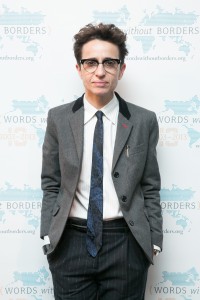
Journalist and author Masha Gessen
What am I most excited for? Forthcoming English translations of Sinan Antoon’s work – which he is translating himself. I asked him why he’s chosen to do his own translations. “It gives me more leeway… I don’t have the guilt about you know violating the [original]… even though I don’t believe in the ‘original,’” he said referencing the idea well-known among translators that perfect loyalty to the text is impossible. Writers often talk about trying to translate their own writing and getting stuck editing or rewriting in the new language. But Antoon said, “I spend a very long time on the Arabic, by the time it’s done, these characters have already said what they said, and did what they did, and I don’t really imagine them to do anything else. So actually the problem is psychological because it takes you back to the emotional zone of all of these things and it’s very problematic.”
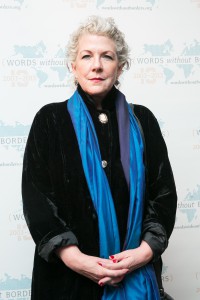
Jennifer Clement, writer and president of PEN International
In his introduction, Ian Baruma, the new editor of the New York Review of Books, said, “Living in New York, you feel like the world will come here, and there’s no great need to know what goes on anywhere else. It leads to a certain provincial attitude.” At an event like the WWB gala, it’s hard not to feel that indeed, what more could you be missing? And yet, the many stories we are still missing out on is exactly what everyone showed up to promote and discuss. “People in the periphery often do know more because they feel that they have to know more. It means that countries like Italy and Holland and Romania, they translate far more than is the case in English-speaking countries and that’s what we’re celebrating tonight. Words Without Borders is trying to change this situation.”
Photo credit to Beowulf Sheehan. The featured image pictures Jill Schoolman, the Ottaway Award winner, Drenka Willen of HMH and Barbara Epler of New Directions (both previous Ottaway winners), and Jim Ottaway.
Madeline Jones is an editorial assistant at Henry Holt and Company and a U.S. Editor-at-Large for Asymptote. She lives, writes, and eats mac and cheese in Brooklyn.
*****
Read more dispatches here:

